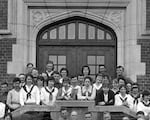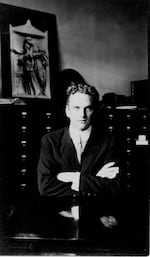
In 1911, a small liberal arts college was launched in Portland, Oregon with its sole mission to promote the life of the mind. Founded by a prominent minister and brought to life by a visionary young upstart president, Reed College soon became a well-regarded institution of higher learning nationally but also something of a lightning rod for criticism locally.
This is the history of a college confronting wide-ranging public opinion even as it strives to live up to its founders’ ideals.

OREGON EXPERIENCE: REED examines the history of a college striving to live up to its founders' ideals while continually confronting a wide range of public opinion.
Just before the turn of the century, Thomas Lamb Eliot, a young minister in Portland, had a vision of creating a college in the growing city. He shared that dream with Simeon Reed, a wealthy friend and confidant. Reed, one of the founders of the Oregon Steam Navigation Company, made a bequest in his will for the establishment of an institution of higher learning in Portland. His widow, Amanda, was determined to fulfill her husband's wishes, but when she died, the convoluted terms of the will took years to unravel. In the end, it was decided that Reed would be a liberal arts college where students would come to learn "for the sake of learning."
Its first young president, William Trufant Foster, was determined to make Reed an intellectual hot house of academic freedom. He recruited faculty from around the country. With an average age under 30, this new guard soon began to achieve renown.
From its early days, there was a complicated town/gown relationship between Reed and Portland. From radicalism to financial crises to unconventional teaching methods to experiments with co-ed living arrangements as early as the 1950s, there has been no shortage of controversy associated with Reed. But with the third highest percentage of students in the country going on to obtain their Ph.D. degrees, along with an extraordinary number of Rhodes and Fulbright Scholars and other honors, Reed is considered among the nation's academic elites. And, unlike most of its peer institutions, Reed, with an enrollment of about 1,400 students, still has no varsity sports teams, fraternities or sororities.
The story is richly woven together with interviews from Reed alumni from over the years, and photos and film from the archives of Reed College.
Resources
Books
John Sheehy, Comrades of the Quest: An Oral History of Reed College
Burton Clark , The Distinctive College
Gary Snyder, Myths & Texts
Gary Snyder, Riprap and Cold Mountain Poems
Gary Snyder, Turtle Island
Gary Snyder, He Who Hunted Birds in His Father's Village: The Dimensions of a Haida Myth
Gary Snyder, The Practice of the Wild
Gary Snyder, Danger on Peaks
Gary Snyder, Back on the Fire: Essays
Lew Welch, Wobbly Rock
Lew Welch, Ring of Bone
Lew Welch, Selected Poems
Philip Whalen, Self Portrait from Another Direction
Philip Whalen, Memoirs of an Interglacial Age
Philip Whalen, Like I Say
Philip Whalen, Every Day
Philip Whalen, Scenes of Life at the Capital
Philip Whalen, Heavy Breathing: Poems 1967-1980
Philip Whalen, Overtime: Selected Poems by Philip Whalen
Philip Whalen, The Collected Poems of Philip Whalen
Web sites
Reed College Centennial Website
Broadcast Date: October 11, 2011